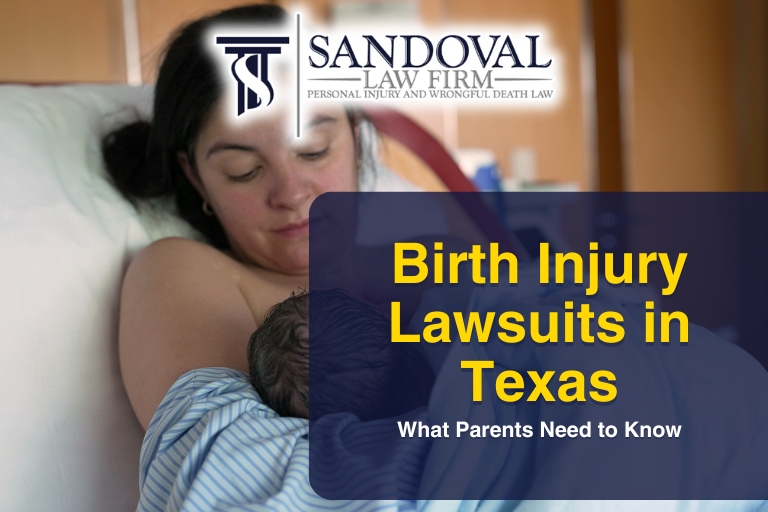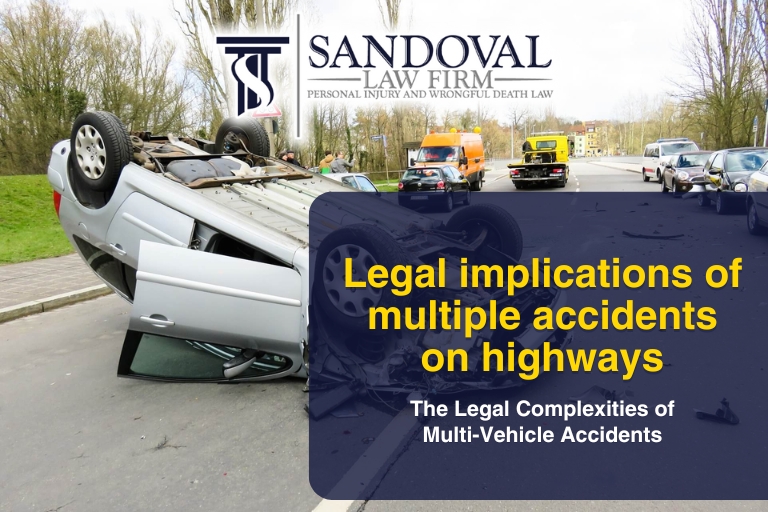How Sandoval Law Firm Builds Strong Legal Claims for Families When a joyous occasion like childbirth turns into a nightmare due to medical negligence, families are left searching for answers—and justice. At Sandoval Law Firm, we understand how overwhelming it can be to face the aftermath of a birth injury. That’s why we’re committed to guiding Texas families through every step of the legal process, offering compassionate support and aggressive legal representation. Understanding Texas Medical Malpractice Laws Texas has specific and often complicated laws when it comes to medical ... Continue Reading
Texas Injury Resources
Birth Injury Lawsuits in Texas: What Parents Need to Know
Texas families face unique legal challenges when it comes to pursuing a birth injury claim The state has strict deadlines—known as statutes of limitations—which limit how long you have to take legal action. In most cases, a medical malpractice claim involving a birth injury must be filed within two years of the date the injury occurred. However, exceptions may apply if the injured child is a minor, so it’s important to speak with an attorney as soon as possible. At Sandoval Law Firm, we understand the intricacies of Texas medical malpractice laws and how to build strong cases for families ... Continue Reading
How a Car Accident Attorney in Houston Can Maximize Your Compensation
After a car accident, victims often face physical, emotional, and financial challenges Many individuals don’t realize the full extent of the compensation they are entitled to and end up settling for less than they deserve. Hiring an experienced car accident attorney in Houston can make a significant difference in the outcome of your case, ensuring you receive maximum compensation for your injuries and losses. Here's how. The Role of a Car Accident Attorney in Maximizing Compensation A skilled car accident attorney provides invaluable guidance and expertise, advocating for your rights and ... Continue Reading
Houston Car Accident Attorney: Navigating the Legal System After a Crash
Car accidents in Houston can turn lives upside down in an instant Whether it’s a minor fender bender or a serious collision, the aftermath can leave victims overwhelmed with medical bills, insurance claims, and legal complexities. Hiring a skilled Houston car accident attorney is a crucial step toward understanding your rights and securing the compensation you deserve. Here’s a guide to navigating the legal system after a crash. Why You Need a Car Accident Attorney in Houston After a car accident, victims often face challenges in dealing with insurance companies, determining fault, and ... Continue Reading
Legal Implications of Multi-Vehicle Pileups on Houston’s Busy Highways
The Legal Complexities of Multi-Vehicle Accidents Multi-vehicle accidents, also known as chain-reaction crashes, are a frequent and dangerous occurrence on Houston’s bustling highways. These incidents often result in significant physical injuries, property damage, and legal complexities that can overwhelm those involved. This article explores the legal implications of multi-vehicle pileups, focusing on how liability is determined and the unique challenges of pursuing compensation in these cases. The Legal Complexities of Multi-Vehicle Accidents Multi-vehicle pileups involve numerous ... Continue Reading
Dealing with Uninsured Motorists in Houston: What You Need to Know
Car accidents are stressful under any circumstances, but the situation becomes even more complicated when the at-fault driver is uninsured. In Houston, a city with a high volume of traffic and frequent accidents, dealing with an uninsured motorist can leave victims uncertain about their options. This article explores the challenges posed by uninsured drivers, the legal options available, and how a car wreck lawyer can help you recover the compensation you deserve. The Challenges of Uninsured Motorist Accidents When you’re involved in an accident with an uninsured driver, you face several ... Continue Reading
Understanding Houston’s Aggressive Driving Culture: Legal Recourse for Victims of Road Rage
Houston is a bustling metropolis, home to some of the busiest highways in the United States Unfortunately, its reputation for heavy traffic comes hand in hand with an alarming prevalence of aggressive driving and road rage incidents. For those who fall victim to this behavior, understanding your legal rights is critical. This article explores the issue of aggressive driving in Houston and the legal options available for victims of road rage. What is Aggressive Driving and Road Rage? Aggressive driving and road rage are terms often used interchangeably, but they represent distinct ... Continue Reading
Navigating Houston’s Complex Roadways: Legal Tips for Out-of-Town Drivers Involved in Accidents
Houston's sprawling highways and intricate road systems can be challenging for out-of-town drivers The combination of high traffic volumes, aggressive driving, and unfamiliarity with local roads increases the likelihood of accidents. If you're an out-of-town driver involved in a Houston car accident, understanding the legal process and knowing how to protect your rights is critical. This guide provides essential tips and highlights why hiring a Houston-based attorney is vital for navigating the complexities of local laws. Why Houston’s Roads Pose Challenges for Out-of-Town Drivers High ... Continue Reading
Hit-and-Run Accidents in Houston: How to Pursue Compensation When the Other Driver Flees
What Victims Need to Know to Pursue Compensation Hit-and-run accidents are unfortunately all too common in Houston, leaving victims not only dealing with potential injuries and damages but also the uncertainty of how to seek compensation. When the other driver flees the scene, it may feel like justice is out of reach. However, victims have legal avenues available to recover losses. This guide covers essential steps and options for victims of hit-and-run accidents in Houston, and how an attorney can play a vital role in helping them secure the compensation they deserve. Understanding the ... Continue Reading
Dealing with Distracted Driving Accidents on Houston’s Major Highways: Legal Options
Distracted driving is an ever-growing concern on Houston’s bustling highways Major arteries like I-45 and I-10 are frequented by countless drivers daily, and as a result, accidents due to driver inattention have surged. For those impacted by these incidents, understanding legal options is crucial to securing fair compensation and justice. Here’s an in-depth look at the issue and how Houston residents can respond after a distracted driving accident. The Rise of Distracted Driving on Houston’s Highways Distracted driving refers to any activity that diverts attention from the primary task ... Continue Reading
- 1
- 2
- 3
- …
- 20
- Next Page »










